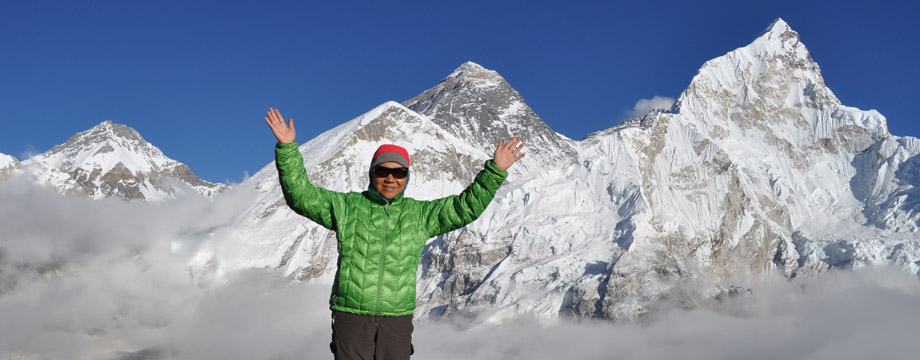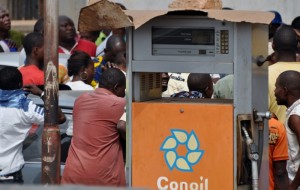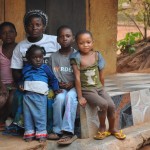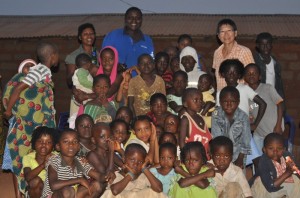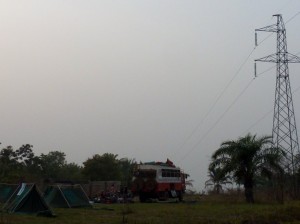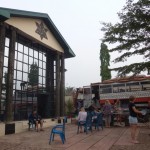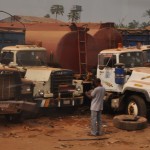According to the original itinerary, I would spend 11 days visiting the Afi Mountains, the Yankari National Park, Jos, Abuja (the capital) and Abeokuta before crossing into the Republic of Benin. A week-long national strike ground Nigeria to a halt. Amidst uncertainty, travel warnings and fear of fuel shortage, we raced through Nigeria covering some 1000km in 5 days.
Background
Nigeria is the most complex and one of the most ancient countries in Africa. With a total area of 924,000 square kilometres, it is Africa’s most populous country with a population of 150 million. It has 36 states and the Federal Capital Territory (Abuja).
There are some 250 ethnic groups. The main ones include the Yoruba (in the southwest), Hausa (north) and the Igbo (southeast), each making up about a fifth of the population. The northern Fulani accounts for about 10%. Christianity is the religion of the south and Islam is the faith of the north.
The country is rich in natural resources. Oil and natural gas account for a third of its GDP. It dominates the region economically.It also has tin, iron ore and coal. Its GDP and GDP per capita (2009) reached US$339 billion and UD$2300 respectively. But the gap between the rich and poor is enormous and over 90% of the population is said to be living on under US$2 a day.
The Western world began to appreciate the art works from this land when the British looters brought back bronze plaques from the powerful empire what occupied the land around the Benin City. Nigeria had many small states headed by obas (chiefs or kings) whenEuropean explorers, traders and colonisers arrived. During the scramble of Africa, Nigeria was grabbed by Britain and was divided into two- the southern colony and the northern Protectorate and ruled indirectly through local kings and chiefs.
Movement for independence swept through Africa after World War II. Nigeria became an independent republic on October 1, 1960. But the country has fallen victim of power struggles, instability brought by regional tension, coups, and riots,secession of Biafra in 1967, military rule and dictatorship. Things did not go well and the first coalition government of the First Republic was a disaster and politics began to degenerate into regional self-interest.
In early 1966, a group of Igbo army officers staged the first coup and General Ironsi, head of the army, took power but was overthrown only four months later by Yakubu Gowon and a state of emergency was announced. In 1967, Lt Colonel Ojukwu announced the session of Biafra. In 1975, Gowon’s military government was overthrown by General Murtala Mohammed who was assassinated a few months later in 1976. His successor Biafran drafted a US-style constitution.
In 1979, Shehu Shagari was elected. He was ousted in a coup taking place on the New Year’s Eve in 1983 shortly followed by another coup. General Ibrahim Babangida came into power in 1985 and promised a return to democracy. He was forced out of power in 1995 and replaced by General Sani Abachu, a dictator who died of a heart attack in the company of two prostitutes! Abdulsalam Abubakar, his defence chief was sworn it. Elections were held and in Feb 1999, Olusegun Obsasnjo, the former military leader and a southern Yoruba Christian was elected President.
After a relative stable 8-year rule under Obasanjo (by Nigerian standard), Yar’ Adua was elected President in the 2007 general election.Nigeria’s developments have been sadly impeded by regional, ethnical and religious differences, military rule and dictatorship, unstable government and rampant corruption. It has a poor image and is often seen as a corrupt and dangerous failed nation.
Day 10 (Saturday, January 14): Ekok, Cameroon border – Ikok, Nigeria – Afi Mountain (100km; 3hrs)
Nigeria is infamous for its political instability and personal security is also an issue. Government’s proposal to remove a fuel subsidy triggered off widespread discontent and unions called for a national strike which eventually commenced on January 9 (while we were in Limbe, Cameroon).
As we had to pass through Nigeria to reach Benin, Mike and Ant had closely monitored the situation and tried to work out various options. Safety and certainty are our prime concern. They filled up the gas tank and got a full spare tank in Cameroon as it was uncertain whether they could get a refill in Nigeria.
On the eve of departure for Nigeria, there was still no sign of the end of the strike. Mike and Ant, our guide decided to take the shortest possible route across Nigeria. We crossed the border into Nigeria without much hassles taking only 40 minutes to go through the formalities. We stopped at Ikok to get food for the next two days. Mike and Ant also stocked up rice, pasta, canned food for the group just in case of further troubles ahead.
We arrived at a lovely camp site in the Afi Mountains Wildlife Sanctuary. The visitor centre which is vacant provides us with a cover to set up our cooking tables. Jens prepared a simple but delicious creole rice dish and others enjoyed it very much.
Gary invited me to have vodka with coke. I enjoyed my after dinner drink and for the first time, I slept through the night even without turning my back!
Day 11: Afi Mountain
I woke up feeling on top of the world with the first good sleep in a tent. I had a lovely and full day.
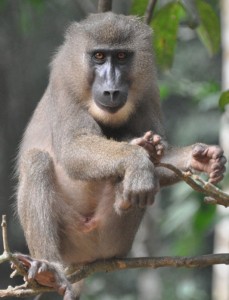 |
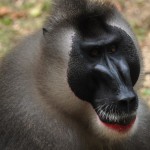 |
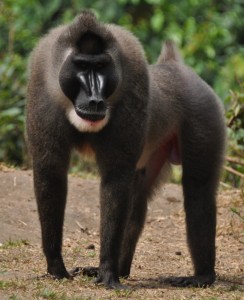 |
We visited the Drill Ranch run by the American Wildlife charity Pandrillus set up by Lisa and Peter some 22 years ago when they passed through the area as tourists. They rescue and re-habitat drill monkeys and chimps. Drill monkeys, native only to Cross River State in Nigeria, southwest Cameroon and the island of Biokoin in Equatorial Guinea, are one of Africa’s most endangered primates. The charity also runs a centre in Calabar and Limbe.
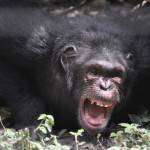 |
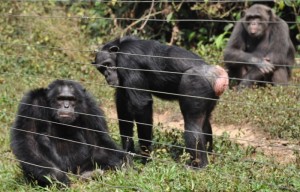 |
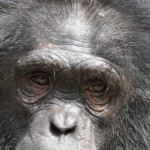 |
In the ranch, there are some 300 primates divided into five groups (4 for drill monkeys and one for gorillas). I met Lisa and Peter and two volunteers, Jens and Chris. The ranch plays a major role in the local economy: it employs some 20 people from the Boki village and it buys food for the primates from the village. The annual budget is about US$200,000 and most of it is spent on food for the primates. The ranch is well managed and we spent an hour watching these lovely animals.
Christopher then led us on a 400m-long canopy walk. There are ten stations built and designed by the Canadian. The highest one is 25-metre high above the ground. The last stop was the Bano Waterfall where I had a wonderful cool swim before heading back to the camp site.
Christopher had kindly offered to take me to see his village. Others preferred to stay at the site and rest. Hence I left on foot with Christopher after 4:30pm. We walked for some 40 minutes before Christopher saw his friend on a motorbike. We hopped on and had a short ride.
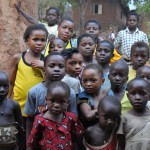 |
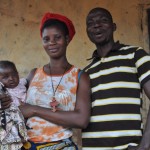 |
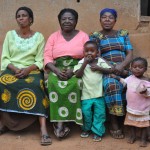 |
Boki has a population of 1500 persons. The mud houses are neat and tidy: there is no rubbish around and people were all in their nice and clean Sunday dress. I tried fufu made with cassava flour and some vegetables. I confess I do not like it too much.
We walked around the village attracting tens of children following us. I took dozens of photos with the children. I also discovered it is the tradition to place the tomb of their relatives just outside their houses. They like their close deceased relatives to remain close!
I had a lift back in a ranch’s jeep back to the ranch. Then Jens and Chris walked me back to the camp site and I brought them beer! I was away for over four hours and they started to wonder whether I got lost in the jungle!
Day 12: Afi Mountain – Ikok – Enugu (320km; 9hrs)
The news about the strike was most confusing. Some said the unions and the government had reached agreement to end it. Others said the talk was broken off without consensus. In any case, Mike and Ant decided to speed cross Nigeria as anything could happen and they did not want to get stuck without gas or food.
 |
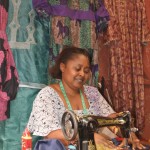 |
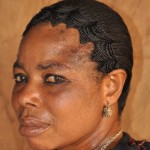 |
 |
We made a stop at Ikok and spent another hour in shopping in the local market. This time, life seemed to be back to normal as the market had more stalls open (our first visit to Ikok on Day 10, there were not many people on the street). I had a nice time chatting to a dress-maker and a couple of stall keepers and took pictures for them.
Mike started to look for a camp site around 5pm. We found one on a side road with goats and cows grazing under the power pylons. The cooking team was preparing the dinner when I started to clean myself with baby-wipe (the only way to keep myself clean when bush camping unless the camp site is by a stream or has a water-pipe).
It’s lucky that Ant spotted a hotel sign ‘Switz Garden Hotel’ on the main road around 8pm. outside the centre of Enugu. There are only eight rooms and we took over the hotel at a reasonable price. The cooking team resumed cooking and we had a lovely dinner with baked beans, sausages and bread. It was nice to have a cold shower and a sound sleep under a fan for a change.
Day 13: Enugu –Onitsha – Benin City – Abeokuta (580km; 10hrs)
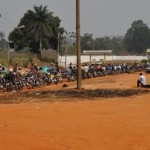 |
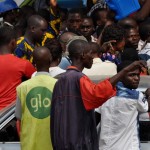 |
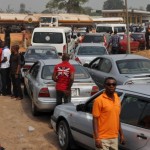 |
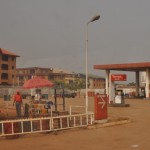 |
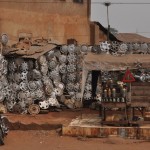 My first impression of Nigeria is basically shaped by what I saw from my truck window. A few things struck me. It is shocking to find hundreds of abandoned petrol stations under all sorts of names along the expressway (I do not understand why there are so many brand names for oil stations and why so many stations need to be built in the first place).
My first impression of Nigeria is basically shaped by what I saw from my truck window. A few things struck me. It is shocking to find hundreds of abandoned petrol stations under all sorts of names along the expressway (I do not understand why there are so many brand names for oil stations and why so many stations need to be built in the first place).Second, the strike came to an end and life was gradually coming back to normal (we were told). There were long queues at some of the petrol stations while some had no petrol and remained closed. The price of petrol jumped from naira 65 to 97 (But I was told the government still has to provide a subsidy of over naira 40 per litre). At one of the stations, the car queue was over a kilometre long and many angry motorbike riders held their empty cartons up in the air. What a scene. I suppose an agitated crowd could easily become a mob and break into riots.
Third, the expressway near Onitsha is dirty and its open space and roadside are filled with rotten or used car and car parts.
Fourth, I experience the noisy, messy and crazy Nigeria as a truck passenger. I must say the expressway is not too bad by African standards. But strangely, there are hardly many directional signs! The maps Mike and Ant had in hand are also out of date.
Fifth, as a result of Harmattan wind carrying the sand south from the Sahara, it is impossible to have clear views of landscape or blue sky. The controlled burning of the land also does not help. It simply looks smoky and blurred!
After Benin City, I found the road condition better and the air was less smoky. We finally arrived at our 5-star camp site by a golf course in Abeokuta just before 8pm.
Day 14: Abeokuta– rest day
Seona did not feel well for four days and had a fever. Mike took her to see a doctor in town and dropped us near the market.
I was not on the cooking team and had the whole day to myself. I spent an hour strolling around the huge food market. There are sections for live poultry and goats for sale. A lady told me to get a goat for naira 13000 (naira 160 for one US dollar). Then I spent two hours on the internet which speed is not too slow. I emailed Lawrence, my brother and friends to let them know I am safe and sound in Nigeria.
On my way back to the camp site, I stopped at a street stall and had grilled beef with spice on the street. The meat was chewy but tasty. It took me almost an hour to walk back to the camp site. Walking is good for me giving me a chance to see the local people and watch the street scene.
Abeokuta is the capital of the Ogun State. I saw many buildings with colonial features a large stadium and many government buildings including a huge new World Health Organisation office block (probably the best building in town) on the main boulevard. The city has many huge granite boulders and I find it tidier and prosperous than the three cities we sped through the day before. I chatted with a few Muslim female stall keepers in the market and had a good laugh with them. They said they live peacefully with their Christian neighbours. This should be the way they live! Maybe, I am too naïve and idealistic!
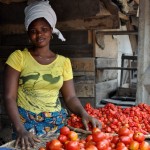 |
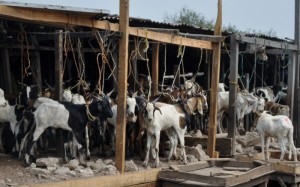 |
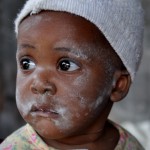 |
I had a beer when I got back to the camp site around 3:30pm and spent the rest of the afternoon typing up my travel notes on Cameroon. This is my ‘3R’ time i.e. to recall what I have done, to reflect and to relax.
As usual I went to bed early. Others had a great time drinking, chatting and laughed most heartily till midnight.
Day 15 (Thursday, January 19): Abeokuta, Nigeria–Abomey, Benin(200km; 6hrs)
We set off after 8am and stopped at a dozen road-blocks. On two occasions, the officer came to conduct a head count. When the immigration officer looked at my passport and asked about my profession, I replied faithfully ‘retired’. He said humourously ‘retired’ but ‘not tired’. He is 100% correct!
We finally reached the border check-point at 12 noon. But it took the customs and border control staff almost two hours to clear our papers. Mike parked the truck and we had our sandwich lunch while waiting! The boys even had a game of football after lunch.
The border between Nigeria and Benin here is hardly visible. Only when we began to see signs and writing in French did we realize that we finally arrived in Benin. It was 2pm when Mike took our passports to the Benin border control for clearance while we changed our naira into West African franc.
Remarks
Nigeria is known to be one of the most corrupt, dangerous and difficult countries for travellers and businessmen. I was looking forward to seeing the country for myself and get to know the people and their cultures. Unfortunately, the national strike has robbed me of this rare opportunity. But there is nothing one can do as safety is the prime consideration in such circumstances.
Though I have mainly seen Nigeria from the expressway, I can feel its pulse through a glimpse of their markets and the flurry of activities on the roadside. Nigerians are enterprising and love to keep their own stalls, large or small. I love chatting with stall keepers in the market and my visit to Boki and find the villagers most friendly. Though their houses are small and they do not have much money, they seem happy, going to church every Sunday, laugh, sing and dance!
The Drill Ranch at Afi Mountains is remarkable. I admire the dedication of Lisa and Peter who set up the charity and hope they will get more financial and community support for their excellent work.
My memories of Nigeria include messy, dirty but vibrant markets, noises from people and vehicles, friendly Nigerians with broad smiles who sing and sway their body to music. Faces of angry men with their jerry cans and long queues of cars at the petrol stations, hundreds of roadblocks on the road and the same questions the policemen and officials put to our guides are also souvenirs from Nigeria.
It’s a great pity that I have not seen the real Nigeria. But to be in Nigeria during a national strike gave me some idea of what life can be i.e. frustration, uncertain about when the problem will end, nervous about whether it will lead to chaos, civil disturbances and riots. The National Bureau of Statistics estimates that the total loss during the week-long strike was around naira200 billion while the estimate by the Central Bank of Nigeria is about naira100 billion a day.
The people of Nigeria deserve a better life. The politicians and the people need to sort themselves out. Nigeria can be a powerhouse given its natural resources. But until it has rule of law, peace and order, an efficient administration and a common purpose, it is impossible to make progress.

